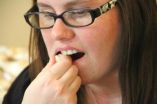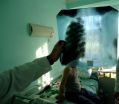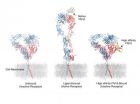(Press-News.org) VIDEO:
Women who have trouble getting pregnant may be under too much stress, according to a newly published study in the journal of Human Reproduction. Doctors have known for some time...
Click here for more information.
Having difficulty getting pregnant can be an incredibly stressful experience for any couple. Now, for the first time, researchers have data that suggests preconception stress might play a role in infertility.
Extending and corroborating their earlier study conducted in the UK that demonstrated an association between high levels of stress and a reduced probability of pregnancy, this work adds new insight by suggesting that stress is associated with an increased risk of infertility. The study findings appear online in the journal Human Reproduction.
Courtney Denning-Johnson Lynch, director of reproductive epidemiology at The Ohio State University Wexner Medical Center, and colleagues found that women with high levels of alpha-amylase – a biological indicator of stress measured in saliva – are 29 percent less likely to get pregnant each month and are more than twice as likely to meet the clinical definition of infertility (remaining not pregnant despite 12 months of regular unprotected intercourse), compared to women with low levels of this protein enzyme.
Researchers tracked 501 American women ages 18 to 40 years who were free from known fertility problems and had just started trying to conceive, and followed them for 12 months or until they became pregnant as part of the Longitudinal Investigation of Fertility and the Environment (LIFE) Study. Saliva samples were collected from participants the morning following enrollment and again the morning following the first day of their first study-observed menstrual cycle. Specimens were available for 373 women and were measured for the presence of salivary alpha-amylase and cortisol, two biomarkers of stress.
"This is now the second study in which we have demonstrated that women with high levels of the stress biomarker salivary alpha-amylase have a lower probability of becoming pregnant, compared to women with low levels of this biomarker. For the first time, we've shown that this effect is potentially clinically meaningful, as it's associated with a greater than two-fold increased risk of infertility among these women," said Lynch, the principal investigator of the LIFE Study's psychological stress protocol.
Lynch said results of this research should encourage women who are experiencing difficulty getting pregnant to consider managing their stress using stress reduction techniques such as yoga, meditation and mindfulness. However, she said that couples should not blame themselves if they are experiencing fertility problems, as stress is not the only or most important factor involved in a woman's ability to get pregnant.
Germaine Buck Louis, director of the Division of Intramural Population Health Research of the Eunice Kennedy Shriver National Institute of Child Health and Human Development (NICHD) and the LIFE Study's principal investigator, said, "Eliminating stressors before trying to become pregnant might shorten the time couples need to become pregnant in comparison to ignoring stress. The good news is that women most likely will know which stress reduction strategy works best for them, since a one-size-fits-all solution is not likely."
INFORMATION:
This work was supported with intramural research funds from the Eunice Kennedy Shriver NICHD. Other collaborators included Dr. Rajeshwari Sundaram and José Maisog of the NICHD and Dr. Anne Sweeney of the Texas A&M Health Science Center.
Study: Stress impacts ability to get pregnant
Researchers find stress can delay pregnancy and double the risk of infertility
2014-03-24
ELSE PRESS RELEASES FROM THIS DATE:
When mothers are active so are their children -- but many mothers are not
2014-03-24
Parents are strong influences in the lives of young children, with patterns of behaviour established in the early years laying the foundation for future choices. A new study suggests that, when it comes to levels of physical activity, it is mothers who set (or don't set) the pace.
An analysis of the physical activity levels of more than 500 mothers and pre-schoolers, assessed using activity monitors to produce accurate data, found that the amount of activity that a mother and her child did each day was closely related. Overall, maternal activity levels were strikingly ...
Integrating mental health services in pediatric practices feasible, effective, Pitt finds
2014-03-24
PITTSBURGH, March 24, 2014 – Brief behavioral and mental health programs for children can be effectively provided within pediatric practices as an alternative to being referred to a community specialist, University of Pittsburgh Schools of the Health Sciences researchers found in a National Institutes of Health-funded randomized trial.
Behavioral health treatment provided in the pediatrician's office resulted in improved access to care, greater participation by both the child and their caregiver in treatment programs, and higher rates of treatment completion, without ...
Use of mood-stabilizing drug linked with reduced risk of developing head and neck cancer
2014-03-24
A new study indicates that a commonly used mood stabilizing drug may help prevent head and neck cancer. The study is published early online in Cancer, a peer-reviewed journal of the American Cancer Society.
Valproic acid (VPA) is currently prescribed as an anti-seizure medication and mood stabilizer, but it is also being studied as an anticancer agent because it inhibits histone acetyl transferases, which help control gene expression by changing DNA structure.
Johann Christoph Brandes MD, PhD, of the Atlanta Veterans Affairs Medical Center and Emory University in Atlanta, ...
New consensus reached to help tackle multidrug-resistant and extensively drug-resistant TB
2014-03-24
New consensus statements have been developed to help tackle the growing threat of multidrug-resistant tuberculosis (TB) and extensively drug-resistant tuberculosis (TB).
Published online today (24 March 2014) in the European Respiratory Journal¸ the statements mark the first time that physicians who treat patients with multidrug- and extensively drug-resistant TB have reached a consensus on important areas of patient management where scientific evidence is inconclusive.
The World Health Organization (WHO) estimates that currently 450,000 new cases with MDR-TB occur ...
The Lancet journals: World TB Day media alert
2014-03-24
To mark the Stop TB Partnerships' World TB Day on Monday 24 March 2014, The Lancet journals will publish a special new collection of Reviews, Comment, and Articles to cast light, and the world's attention, on tuberculosis, in the hope of raising this disease higher up the agendas of international communities.
The new publications discuss topics ranging from extremely drug-resistant tuberculosis, to the role of advocacy in tuberculosis, and new anti-tuberculosis drugs, highlighting the key areas and challenges to be met if inroads are to be made into winning the battle ...
New childhood tuberculosis estimates double the number previously thought
2014-03-24
Researchers from Brigham and Women's Hospital (BWH) and Harvard Medical School (HMS) in Boston have estimated that around one million children suffer from tuberculosis (TB) annually— twice the number previously thought to have tuberculosis and three times the number that are diagnosed every year. The researchers also estimated that around 32,000 children suffer from multidrug-resistant tuberculosis (MDR-TB) annually. These findings are published in The Lancet on March 23, 2014.
"Despite children comprising approximately one quarter of the world's population, there ...
Mass. General study identifies path to safer drugs for heart disease, cancer
2014-03-23
Massachusetts General Hospital (MGH) investigators may have found a way to solve a problem that has plagued a group of drugs called ligand-mimicking integrin inhibitors, which have the potential to treat conditions ranging from heart attacks to cancer metastasis. In a Nature Structural & Molecular Biology paper receiving advance online publication, the researchers provide a structural basis for the design of new and safer integrin inhibitors.
Integrins are receptor proteins found on the surface of cells that determine whether or not cells adhere to adjacent cells and ...
Unavoidable disorder used to build nanolaser
2014-03-23
Researchers the world round are working to develop optical chips, where light can be controlled with nanostructures. These could be used for future circuits based on light (photons) instead of electron - that is photonics instead of electronics. But it has proved to be impossible to achieve perfect photonic nanostructures: they are inevitably a little bit imperfect. Now researchers at the Niels Bohr Institute in collaboration with DTU have discovered that imperfect nanostructures can offer entirely new functionalities. They have shown that imperfect optical chips can be ...
Could diamonds be a computer's best friend?
2014-03-23
COLUMBUS, Ohio—For the first time, physicists have demonstrated that information can flow through a diamond wire.
In the experiment, electrons did not flow through diamond as they do in traditional electronics; rather, they stayed in place and passed along a magnetic effect called "spin" to each other down the wire—like a row of sports spectators doing "the wave."
Spin could one day be used to transmit data in computer circuits—and this new experiment, done at The Ohio State University, revealed that diamond transmits spin better than most metals in which researchers ...
Leukaemia caused by chromosome catastrophe
2014-03-23
Researchers have found that people born with a rare abnormality of their chromosomes have a 2,700-fold increased risk of a rare childhood leukaemia. In this abnormality, two specific chromosomes are fused together but become prone to catastrophic shattering.
Acute lymphoblastic leukaemia, or ALL, is the most common childhood cancer. Scientists previously found that a small subset of ALL patients have repeated sections of chromosome 21 in the genomes of their leukaemia cells. This form of ALL – iAMP21 ALL – requires more intensive treatment than many other types of ALL. ...
LAST 30 PRESS RELEASES:
Bacteria frozen in ancient underground ice cave found to be resistant against 10 modern antibiotics
Rhododendron-derived drugs now made by bacteria
Admissions for child maltreatment decreased during first phase of COVID-19 pandemic, but ICU admissions increased later
Power in motion: transforming energy harvesting with gyroscopes
Ketamine high NOT related to treatment success for people with alcohol problems, study finds
1 in 6 Medicare beneficiaries depend on telehealth for key medical care
Maps can encourage home radon testing in the right settings
Exploring the link between hearing loss and cognitive decline
Machine learning tool can predict serious transplant complications months earlier
Prevalence of over-the-counter and prescription medication use in the US
US child mental health care need, unmet needs, and difficulty accessing services
Incidental rotator cuff abnormalities on magnetic resonance imaging
Sensing local fibers in pancreatic tumors, cancer cells ‘choose’ to either grow or tolerate treatment
Barriers to mental health care leave many children behind, new data cautions
Cancer and inflammation: immunologic interplay, translational advances, and clinical strategies
Bioactive polyphenolic compounds and in vitro anti-degenerative property-based pharmacological propensities of some promising germplasms of Amaranthus hypochondriacus L.
AI-powered companionship: PolyU interfaculty scholar harnesses music and empathetic speech in robots to combat loneliness
Antarctica sits above Earth’s strongest “gravity hole.” Now we know how it got that way
Haircare products made with botanicals protects strands, adds shine
Enhanced pulmonary nodule detection and classification using artificial intelligence on LIDC-IDRI data
Using NBA, study finds that pay differences among top performers can erode cooperation
Korea University, Stanford University, and IESGA launch Water Sustainability Index to combat ESG greenwashing
Molecular glue discovery: large scale instead of lucky strike
Insulin resistance predictor highlights cancer connection
Explaining next-generation solar cells
Slippery ions create a smoother path to blue energy
Magnetic resonance imaging opens the door to better treatments for underdiagnosed atypical Parkinsonisms
National poll finds gaps in community preparedness for teen cardiac emergencies
One strategy to block both drug-resistant bacteria and influenza: new broad-spectrum infection prevention approach validated
Survey: 3 in 4 skip physical therapy homework, stunting progress
[Press-News.org] Study: Stress impacts ability to get pregnantResearchers find stress can delay pregnancy and double the risk of infertility






